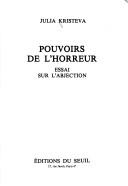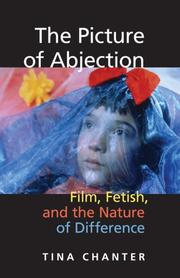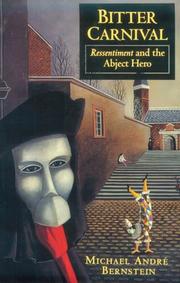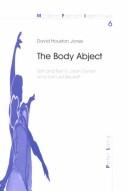| Listing 1 - 10 of 32 | << page >> |
Sort by
|
Book
ISBN: 1784997722 1526109867 9781526109866 9781784997724 9780719096280 0719096286 9780719096297 0719096294 Year: 2017 Publisher: Manchester : Manchester University Press,
Abstract | Keywords | Export | Availability | Bookmark
 Loading...
Loading...Choose an application
- Reference Manager
- EndNote
- RefWorks (Direct export to RefWorks)
Here, an impressive list of authors examine how abjection can be discussed in relation to a host of different subjects, including marginality and gender.
Abjection in literature. --- Abjection in motion pictures. --- Art. --- Culture.

ISBN: 2020066033 9782020066037 Year: 2001 Volume: 152 Publisher: Paris : Seuil,
Abstract | Keywords | Export | Availability | Bookmark
 Loading...
Loading...Choose an application
- Reference Manager
- EndNote
- RefWorks (Direct export to RefWorks)
Abjection --- Horreur --- Dans la litterature
Book
ISBN: 0230389333 9780230389335 Year: 2014 Publisher: Basingstoke: Palgrave MacMillan,
Abstract | Keywords | Export | Availability | Bookmark
 Loading...
Loading...Choose an application
- Reference Manager
- EndNote
- RefWorks (Direct export to RefWorks)

ISBN: 0253219183 9780253219183 9780253349170 0253349176 0253027772 Year: 2008 Publisher: Bloomington : Indiana University Press,
Abstract | Keywords | Export | Availability | Bookmark
 Loading...
Loading...Choose an application
- Reference Manager
- EndNote
- RefWorks (Direct export to RefWorks)
Abjection in motion pictures. --- Sex in motion pictures. --- Abjection au cinéma --- Sexualité au cinéma --- Abjection au cinéma --- Sexualité au cinéma --- Abjection in motion pictures --- Sex in motion pictures --- Sex in moving-pictures --- Motion pictures --- Erotic films --- Pornographic films
Book
ISBN: 9780231214575 9780231561419 Year: 2024 Publisher: New York : Columbia University Press,
Abstract | Keywords | Export | Availability | Bookmark
 Loading...
Loading...Choose an application
- Reference Manager
- EndNote
- RefWorks (Direct export to RefWorks)
In Powers of Horror, Julia Kristeva offers an extensive and profound consideration of the nature of abjection. Drawing on Freud and Lacan, she analyzes the nature of attitudes toward repulsive subjects and examines the function of these topics in the writings of Louis-Ferdinand Céline, Marcel Proust, James Joyce, and other authors. Kristeva identifies the abject with the eruption of the real and the presence of death. She explores how art and religion each offer ways of purifying the abject, arguing that amid abjection, boundaries between subject and object break down.
Horror in literature. --- Abjection in literature. --- Céline, Louis-Ferdinand,
Book
ISBN: 9780230600089 0230600085 Year: 2008 Publisher: Basingstoke : Palgrave Macmillan,
Abstract | Keywords | Export | Availability | Bookmark
 Loading...
Loading...Choose an application
- Reference Manager
- EndNote
- RefWorks (Direct export to RefWorks)
Using Lacanian psychoanalysis and queer theory to explore the unstable relationship between heterosexual masculine identity and cultural representation, this book examines the ways straight men are queered and abjected in literature, theory, and film.
Book
ISBN: 9789052010625 9052010625 Year: 2007 Volume: 3 Publisher: Bruxelles: Peter Lang,
Abstract | Keywords | Export | Availability | Bookmark
 Loading...
Loading...Choose an application
- Reference Manager
- EndNote
- RefWorks (Direct export to RefWorks)
Shame and Desire defines the contemporary cinematic experience in terms that go beyond the visual. Adopting an intersubjective perspective on film studies, the author maintains that the dialectical poles of subject and object, seeing and being seen no longer seem to be valid. We are now surrounded by images that look back at us provocatively, seductively, indifferently ; and not only in movies, but also in art, television, the city, in chance encounters, and in our private relationships.Taking her cue from Jean-Paul Sartre, the author shows how emotions exemplify the way in which we are ‘forced' to see ourselves through the eyes of others, unable to escape an identity that is imposed upon us from the outside but nevertheless resides ‘in the flesh' – in the affective operations of the body and the senses. To illustrate her account of the intersubjective dynamics and affective bonds of cinema, the author explores the contemporary aesthetic investment in the emotional in the work of filmmakers such as Lars von Trier, Michael Haneke and Eija-Liisa Ahtila.This book proposes an insight into the ways in which we are engaged with visual displays and the look with which they respond to our looking.
Abjection dans le cinéma --- Abjection in motion pictures --- Blik in de film --- Gaze in motion pictures --- Regard au cinéma --- Verworpenheid in de film --- Motion pictures --- Gaze in motion pictures. --- Abjection in motion pictures. --- Cinéma --- Abjection au cinéma --- Psychological aspects. --- Aspect psychologique --- film --- filmtheorie --- identiteit --- von Trier Lars --- Haneke Michael --- Ahtila Eija-Liisa --- intersubjectiviteit --- 791.41 --- Cinéma --- Regard au cinéma --- Abjection au cinéma --- Psychological aspects --- Motion pictures - Psychological aspects
Book
ISBN: 3839452104 3837652106 Year: 2020 Publisher: Bielefeld transcript Verlag
Abstract | Keywords | Export | Availability | Bookmark
 Loading...
Loading...Choose an application
- Reference Manager
- EndNote
- RefWorks (Direct export to RefWorks)
Aesthetic disgust is a key component of most classic works of drama because it has much more potential than to simply shock the audience. This first extensive study on dramatic disgust places this sensation among pity and fear as one of the core emotions that can achieve katharsis in drama. The book sets out in antiquity and traces the history of dramatic disgust through Kant, Freud, and Kristeva to Sarah Kane's in-yer-face theatre. It establishes a framework to analyze forms and functions of disgust in drama by investigating its different cognates (miasma, abjection, etc.). Providing a concise argument against critics who have discredited aesthetic disgust as juvenile attention-grabbing, Sarah J. Ablett explains how this repulsive emotion allows theatre to dig deeper into what it means to be human.
Drama; Aesthetic Theory; Disgust; Abjection; Sarah Kane; Aesthetics; History of Theatre; Literary Studies; Literature; Theatre; Theatre Studies --- Abjection. --- Aesthetic Theory. --- Aesthetics. --- Disgust. --- History of Theatre. --- Literary Studies. --- Literature. --- Sarah Kane. --- Theatre Studies. --- Theatre.

ISBN: 0691069395 9786612751530 1400820634 1282751530 140081104X 9781400811045 9780691069395 1400800676 9781400815166 1400815169 9781282751538 9781400820634 Year: 1992 Publisher: Princeton, N.J. : Princeton University Press,
Abstract | Keywords | Export | Availability | Bookmark
 Loading...
Loading...Choose an application
- Reference Manager
- EndNote
- RefWorks (Direct export to RefWorks)
"You people put importance on your lives. Well, my life has never been important to anyone. I haven't got any guilt about anything," bragged the mass-murderer Charles Manson. "These children that come at you with knives, they are your children. You taught them. I didn't teach them. . . . They are running in the streets--and they are coming right at you!" When a real murderer accuses the society he has brutalized, we are shocked, but we are thrilled by the same accusations when they are mouthed by a fictional rebel, outlaw, or monster. In Bitter Carnival, Michael Andr Bernstein explores this contradiction and defines a new figure: the Abject Hero. Standing at the junction of contestation and conformity, the Abject Hero occupies the logically impossible space created by the intersection of the satanic and the servile. Bernstein shows that we heroicize the Abject Hero because he represents a convention that has become a staple of our common mythology, as seductive in mass culture as it is in high art. Moving from an examination of classical Latin satire; through radically new analyses of Diderot, Dostoevsky, and Cline; and culminating in the courtroom testimony of Charles Manson, Bitter Carnival offers a revisionist rereading of the entire tradition of the "Saturnalian dialogue" between masters and slaves, monarchs and fools, philosophers and madmen, citizens and malcontents. It contests the supposedly regenerative power of the carnivalesque and challenges the pieties of utopian radicalism fashionable in contemporary academic thinking. The clarity of its argument and literary style compel us to confront a powerful dilemma that engages some of the most central issues in literary studies, ethics, cultural history, and critical theory today.
Abjection in literature. --- Comparative literature --- Cynicism in literature. --- Heroes in literature. --- Themes, motives. --- Plots (Drama, novel, etc.)

ISBN: 9783906765075 3906765075 Year: 2000 Publisher: Oxford: Lang,
Abstract | Keywords | Export | Availability | Bookmark
 Loading...
Loading...Choose an application
- Reference Manager
- EndNote
- RefWorks (Direct export to RefWorks)
| Listing 1 - 10 of 32 | << page >> |
Sort by
|

 Search
Search Feedback
Feedback About UniCat
About UniCat  Help
Help News
News